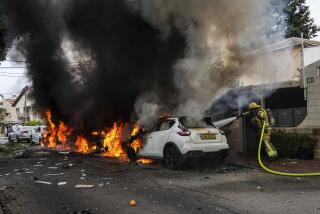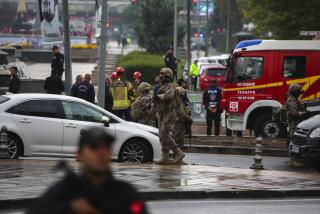Festivities Become Another Tragedy for Kurds
- Share via
IRBIL, Iraq — Shekhalla Ibrahim doesn’t remember the man’s face. He can’t say how old he looked or describe what he was wearing. But Sunday morning, as Ibrahim stood in a receiving line greeting hundreds of well-wishers, he smiled and shook the hand of the man who seconds later detonated explosives hidden under his clothing.
“It’s a miracle that I survived,” Ibrahim said from his hospital bed Sunday night. Ibrahim is deputy head of the Kurdistan Democratic Party’s office in Irbil, the site of one of two deadly suicide attacks that together killed at least 56 people and injured more than 200.
The blast tossed Ibrahim to the wall, where he lost consciousness. A waiter who had been serving chocolates to guests lay dead nearby, the platter of sweets lying across his chest.
“I thought I was dead,” said Ibrahim, who awoke bleeding and dazed with a deep slice over his right eye. Many of the other high-ranking party officials who stood next to Ibrahim in the receiving line -- including the local party chief and a Cabinet minister -- were killed instantly.
“I awoke with their flesh all over my body,” said Ibrahim, 45.
By Sunday evening, several hundred anxious relatives were crowding local emergency rooms for information about loved ones.
Local hospitals struggled with a shortage of beds and equipment as police transported the wounded in the backs of trucks.
“This is the blood of [Deputy Prime Minister] Sami Abdurrahman,” said Irbil police officer Sarhang Omar, 22, pointing to a mixture of blood, dirt and rainwater in the back of his white truck. “I haven’t had time to wash it out. It’s such a tragedy.”
After the blasts, tight security was imposed on the city, with street closures and numerous checkpoints.
Preparations were underway for dozens of funerals to be held today. Ibrahim predicted that the Kurdish city, which had long suffered under Saddam Hussein’s regime, would rebound from the tragedy.
“This is not the first time, and it won’t be the last,” he said. “I survived chemical attacks. I survived Saddam’s bombs. I survived all that. The will of our people is more powerful than bombs.”
Party officials in Irbil, worried about a possible terrorist attack during the Eid al-Adha festivities, had taken precautions such as prohibiting cars from stopping outside the facility, Ibrahim said.
Because of the crowds and a reluctance to offend holiday guests, frisking was sporadic. Officials believe the suicide bomber walked in among the throngs of visitors.
“They didn’t want to have security because it was Eid,” said Nareeman Mohammed, 40, whose cousin suffered severe burns in the blast. “But it was a wrong decision, and this is the result.”
More to Read
Sign up for Essential California
The most important California stories and recommendations in your inbox every morning.
You may occasionally receive promotional content from the Los Angeles Times.













